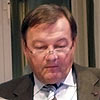In
BBC News, oct. 8th 2008:
When Fernand Herman died in 2005, his widow thought of a fitting epitaph for the former Belgian cabinet minister and Euro MP: "L'Europe est ma patrie" (Europe is my homeland).
But the funeral director warned her that the authorities of Overijse, a Flemish town, would take a dim view of a French-language grave.
Rudy Herman suggested Latin - and "Europa patria mea" passed muster.
Her husband is probably the only French-speaker buried in the cemetery who is remembered by more than a mere name and two dates.
Like many other municipalities near Brussels, Overijse takes language very seriously.
The capital is a cosmopolitan, largely French-speaking enclave within Flanders - and as its swelling population moves out, the suburbs are fighting to preserve their Flemish identity.
In Overijse, the local authorities' zeal is in evidence on the high street. In May, a local restaurant received a letter from the Overijse council, which read:
"As you know, this is a Flemish commune, whose official language is Dutch. However, we notice that your neon sign, 'Thai takeaway', is in English only. We would like to request that you change this to 'Thai meeneemrestaurant'.
"We are also asking you to greet your customers in Dutch 'Goede dag' or 'Goede avond', instead of just in French."
Many non-Dutch shopkeepers insist relations with the Overijse authorities are civil, and accusations of "linguistic cleansing" levelled by some French-speakers are overdone.
A few shops down from the Thai takeaway, a new brasserie has a distinctly Gallic feel to it.
"Moules marinieres" feature prominently on the menu, and the stereo plays songs by Edith Piaf and Charles Aznavour.
Eric Vermersch, the manager, says he uses a Dutch-speaker in his dealings with the town hall, and there is always a Flemish waiter on hand in the brasserie.
"There is a gentleman's agreement. As long as you respect others, you're OK," Mr Vermersch says. "This is nothing like Northern Ireland and Orange marches."
Bloody ethnic strife is not about to break out in Brussels' leafy suburbs - but the war of words can get nasty. Militant groups, such as the Taal Aktie Komitee (TAK), specialise in vandalising non-Dutch billboards and facilities.
One Overijse business whose owner has been resisting official requests to change its English-language sign - "textile repair shop" - is regularly spray-painted with "Nederlands" ("Dutch") graffiti.
Some shopkeepers feel under such pressure that they will only speak under condition of anonymity.
One, in Tervuren, says Belgium's government crisis has poisoned the atmosphere, and led to many Flemish people boycotting his restaurant.
"Over the past 15 months our sales have fallen by 35%," he says. "I'm from a mixed family. I grew up speaking both Dutch and French, I find it sad that it has come to this."
In another suburb, "Jeff" says local officials are encouraging people to report any non-Dutch in-store advertising, adding that he once received a letter complaining about some ads in his food shop.
"I cannot bear for people to tell me how to run my business," Jeff says. "Most of my customers are non-Dutch speakers. If I speak only Dutch, I might as well close up shop."
In fact that is exactly what Jeff is doing. He is moving to France.
(...)
Near Brussels, linguistic defensiveness is fuelled not just by historical grievances, but also fears for the future. What would happen if the flight to the suburbs turned the Flemish into a minority on their own soil?
(...)
But he insists that Flemish land is sacrosanct: "If nobody speaks Dutch in a Flemish town - that will not change our opinion: it still belongs to Flanders."
Mr Van Biesen says he understands the measures taken in some suburbs to stem an expanding wave of newcomers demanding special rights.
"If you give them one inch of ground, they will try to spread to other parts a couple of years later," he says. That lesson is not lost on neighbouring Zaventem. The town, where the Brussels airport is located, is home to a large expatriate community and immigrants from all over the world.
But Mayor Francis Vermeiren is determined to uphold Flemishness. All visitors to the town hall must bring an interpreter if they don't speak Dutch, as staff are banned from speaking another language.
"I speak English to the people from London, and 'je parle en francais' to the people from Wallonia," he says. "We respect the culture of everyone, but we ask that they respect our culture also."
Zaventem has also set a controversial Dutch language requirement for people applying to buy cheap land from the municipality.
"The point is not to keep foreigners out," Mr Vermeiren insists. "The condition is that they should have to either know or learn the language."
But some who are learning Dutch feel they could be made to feel more welcome in Zaventem. Souhaila, a 16-year-old student, says her native French is banned from the school grounds.
"If they catch us speaking French in playground they tell us to stop. If we continue we get a detention. This bothers me," she says.









